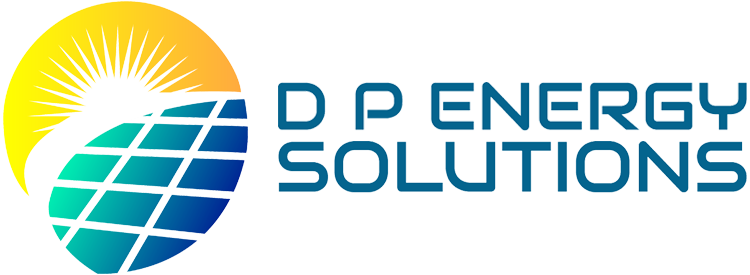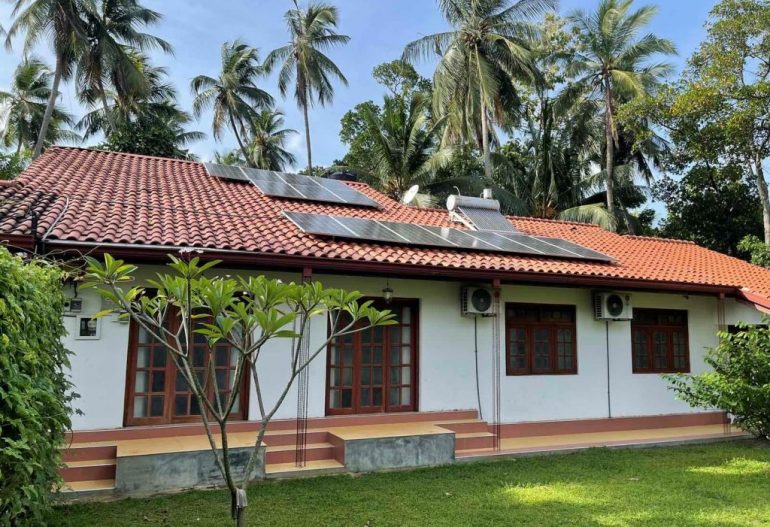Solar energy uses the sun’s light and heat to generate renewable or ‘green’ power. The most common form of solar energy is harnessed by solar panels, or photovoltaic cells. In photovoltaic power stations, they’re arranged almost edge-to-edge to capture sunlight in large fields. You’ll also see them on top of houses and other buildings at times, as well. The cells are created from semiconductor materials. When the sun’s rays hit the cells, it loosens electrons from their atoms. This allows the electrons to flow through the cell and generate electricity.
On a much larger scale, solar collectors can generate power for thousands of people at once. Solar-thermal power plants use a variety of techniques to produce power using the sun. The sun’s energy is used to boil water which, in turn, operates a steam turbine to generate in a similar fashion to that of coal or nuclear power plants.
Advantages
The advantages of powering your home with solar energy are many, but we’ve narrowed the list down to the most important. Here are some advantages to switching your home or business to solar power.
- Lowers Your Electricity Bill
Reducing the monthly electric bill is a priority in most homes, and generating your own energy through the power of the sun is a simple way to reduce your electric bill.
Not only does solar power save money, but it can help you earn more. Some solar energy systems are candidates for state-level incentives, rebates, and federal tax credits. In order to qualify, the system must be certified by the Solar Rating and Certification Corporation (SRCC) or a similar service endorsed by your state government. Because you’re choosing a safer, greener electricity option, the government will reward you with a tax cut helping you save money on installation.
- Environmentally Friendly
Solar energy has far fewer carbon emissions than the standard forms of non-green energy that heavily rely on fossil fuels. Greenhouse gas emissions are insignificant because solar power uses no fuel combustion. Each kilowatt-hour (kWh) of solar energy substantially reduces greenhouse gas emissions like CO2 and other dangerous pollutants such as sulfur oxides, nitrogen oxides, and particulate matter. The more people who choose renewable energy, the cleaner our air will be.
- Moves Us Towards Energy Independence
Limited resources like fossil fuels will one day run out and cannot be replaced, but the sun will keep on shining for another 5 billion years or so. Remaining independent will allow our renewable resources to grow as technology further develops and we find more ways to incorporate renewable energy into everyday life.
- Sustainable
Solar energy could be a stable resource for billions of years. It’s the most abundant energy resource on earth—173,000 terawatts of solar energy strikes the Earth continuously. That’s more than 10,000 times the world’s total energy use.
- Low Maintenance
Most solar energy systems come with a very extended warranty—sometimes up to 25 years. Maintenance usually only requires an annual cleaning, and the solar PV and solar thermal parts will need to be changed out about every 10 years. There are no moving parts, so there’s less that could break down or go wrong. Since solar energy systems are easy to maintain, you won’t have to spend too many repairs. This also makes solar energy systems an attractive choice for people who might not be able to fix or maintain household appliances.
- Benefits the Electricity Grid
Because solar power puts less burden on the electric grid, some U.S. states offer net metering policies. Net metering policies allow those who generate solar power to sell excess electricity to a utility at a retail rate and receive credit on their utility bill. This credit offsets the customer’s electricity consumption during other times of the day or year, which reduces the amount of electricity you need to source (and pay for) from a utility.(4)
Disadvantages
Although there are many reasons to make the switch to an eco-friendly, renewable energy option, solar energy isn’t the best for everyone.
- Substantial Initial Investment
The initial installation of a solar power system can be quite costly upfront. Every company offers different pricing options. Cost can vary depending on your location, a number of solar panels needed, installation requirements, and labor fees. This can be difficult for some households, and getting a loan or accruing credit card debt might be the only option for the purchase.
- Doesn’t Work at Night
Solar energy relies on utility grids to generate power at night when the sun isn’t out. Some solar panel systems have an optional battery backup but not all are available with this option. So when the sun isn’t out, you’ll have to rely on the energy grid like everyone else.
- Energy Storage
If you don’t use your solar energy immediately, it will have to be stored on batteries, which can be both costly and space-consuming. These batteries charge during the day so that you have the energy to use at night.
- Space Constraints
The more electricity you need, the more solar panels you will need, which leads to more space that you will have to use. Not all roofs have adequate space to equip the number of solar panels that customers want or require. Solar panels can also be stored in your yard, but it needs access to an abundant amount of sunlight, so yards with trees won’t suffice.
- Location Matters
Although the sun is an abundant source of energy, its intensity and availability can vary throughout the world. Depending on where you live, your weather conditions might be rainier and cloudier than in other places. In some parts of the world, like Alaska, the sun won’t appear for days in the wintertime, which can be an issue for those relying on solar energy sources.
Solar eclipses can also have an impact on solar energy generators. During an eclipse, those with solar systems will need to get power from other sources of electricity to supplement the decrease in solar power. If you live in an area with low sunlight, planning is everything. Have adequate battery backups to get you through the darker times.
Is Solar Right for You?
As energy customers turn towards more renewable and green energy options, it’s important to differentiate their pros and cons. Before committing to a newer, greener energy source, try to establish a budget that would be affordable to you and your family. Then, calculate what the solar energy option would cost you in the long run and how much it would save over time. Make a list of pros and cons that are personalized to you and your family specifically, so that you can better understand what options are more beneficial to you over others.




